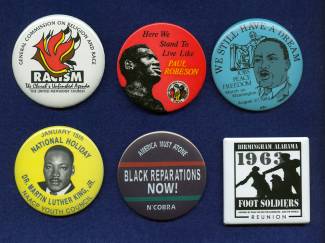Collection Name
About
On August 28, 2004 about three members of the Ku Klux Klan and a few members of a New Jersey based White Nationalist group held a "march" in Sharpsburg, Maryland. Local citizens and organizations held various events nearby to promote peace and unity. The United Methodist Church had a presence at these events and distributed various materials, along with buttons. The United Methodist Church General Commission on Religion and Race was established in 1968. Its purpose is to foster racial justice and reconciliation and to insure that all racial and ethnic minorities participate fully and equally in the Methodist Church.
Paul Robeson (1898-1976) was born the son of a slave. He was an athlete, a Phi Beta Kappa Rutgers graduate, and became famous as a singer and actor appearing as Othello and in Showboat. More importantly, he became a well known civil rights activist. He fought against segregation in both the North and the South and in 1946 founding the American Crusade Against Lynching. Robeson was a supporter of the Soviet Union, and although he denied it, rumored to be a member of the Communist Party. As such he was investigated by the FBI and in 1956 appeared before the House Un-American Activities Committee (HUAC) where he stated, "My father was a slave and my people died to build this country, and I'm going to stay right here and have a part of it, just like you. And no fascist-minded people like you will drive me from it. Is that clear?" Paul Robeson stood up to racists and injustice. He donated funds to Jewish refugees fleeing Germany, and entertained the troops during World War II. On January 20, 2004, and as part of its black heritage series, Robeson was honored with a stamp by the U.S. Postal Service. (This particular button was issued by the Young Workers Liberation League, a Communist sponsored youth organization that was established in 1970 to oppose the war in Vietnam.)
On August 27, 1983, 250,000 people attended the 20th anniversary march commemorating the 1963 March on Washington.
Controversy had surrounded the effort to establish a national holiday for the civil rights leader and clergyman, Dr. Martin Luther King, Jr. Finally, in 1986, President Ronald Reagan declared the third Monday in January a Federal Holiday honoring the birthday of Martin Luther King Jr. It would be on January 20, 1986 that the first official Martin Luther King Day, and the only federal holiday commemorating a black person, was celebrated. This particular button was issued by the NAACP Youth Council. The NAACP's first annual student conference was held in 1940. Over 500 Youth Councils and college NAACP chapters exist today.
N'COBRA was founded in 1987 and stands for the National Coalition of Blacks for Reparations in America. This organization believes that the U.S. Government should pay for the labor of African-American slaves who worked without pay. Payment would not necessarily be in the form of cash, but education, tax relief, and the availability of various resources in order for black Americans to become economically self-sufficient. This N'COBRA button is from the "Millions for Reparations Demonstration and Protest" that was held in Washington, D.C. on August 17, 2002.
The Birmingham, Alabama 1963 "Foot Soldiers" button was distributed at a 2003 reunion to those who participated in a two-month effort to oppose Birmingham's segregationary and discriminatory ordinances. Organized by the Southern Christian Leadership Council (SCLC) as a non-violent protest, participants violated city laws that were felt unfair. City services were disrupted and the jails were filled to capacity. In early May, after a month of peaceful and growing demonstrations, Birmingham Public Safety Commissioner Eugene "Bull" Connor employed police dogs and powerful fire hoses against the demonstrators, including school children who had joined the protest. The photographs made national headlines, and ironically, actually helped secure passage of the 1964 Civil Rights Act.
Buttons from the collection of Albert and Angela Feldstein
Text from over forty years of notes, newspaper and magazine clippings, flyers, and other sources associated with the collecting of buttons and used in the research of the 2003 political history poster entitled, "Buttons of the Cause, 1960-2003: The Events, The People, The Organizations, The Issues".
